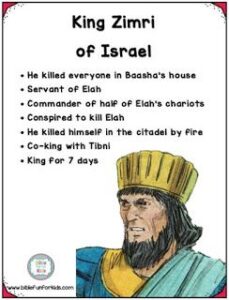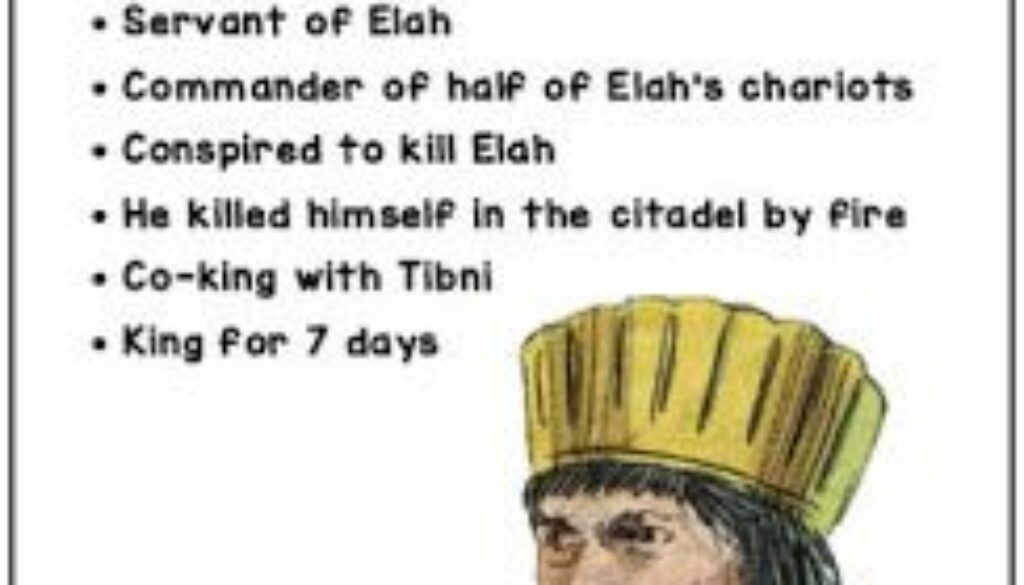1 Kings 16:15-20 Zimri’s Reign

Zimri is the next king in Israel’s lineup. He becomes king by assassination and his reign is the shortest of all. He exits the throne by suicide.
We met Zimri in our reading last time. He was the commander of half of king Elah’s chariots. He was careful and bided his time. He watched Elah’s practices and found the best time to attack him. Once Elah was dead Zimri assumed the throne and killed every man in king Baasha’ family and friends. At that time it didn’t pay to be a friend of the king; especially if you were male.
The problem with Zimri’s plan was that it didn’t take into account how to keep that power. I wish, once again, that we had access to the Book of the Chronicles of the Kings of Israel because we are told there is information on the conspiracy contained within it.
As we saw earlier, Zimri had command of half of the kings chariots but he didn’t control the army. Omri was that man. And the army followed Omri wherever he led. They trusted him. They knew his character and respected his rule. They trusted him enough to crown him as their new king, no matter who had already claimed that position.
Omri led the people straight to Tirzah, where Zimri had both killed Elah and taken the throne. Zimri occupied the same throne that Baasha and his son Elah did. But he didn’t have the backing of the people. He tried but they wouldn’t follow. He had enough of a following to be able to wipe out the men of Baasah’s family and friends but nothing more.
In less than a week Omri and the army of Israel was knocking on the gates of Tirzah. We are not told how long this siege lasted but it ended badly for Tirzah. I wonder if the people had had the opportunity if they would have ‘thrown Zimri’s head over the wall’ to stop the siege. It happened during Sheba’s rebellion.
Zimri wasn’t about to give Omri a chance to ‘pay him back’ for his conspiracy against the king. He took matters into his own hands. He went into the throne room and barricaded himself in. Then he set fire to the room and waited for death to take him.
Burning to death is a HORRIBLE way to die! Did he kill himself right after setting fire to the room? Why did he choose this over being taken? Was he afraid of a much worse fate in the hands of Omri? Had he seen how Omri dealt with those who opposed him before?
One thing I noticed about this method of death is that it broke the cycle that started with Baasha. When Baasha killed Nadab, he killed ALL of Jeroboam’s family. This bloodguilt had to be atoned for. It was set right in the punishment Zimri inflicted on the house of Baasha. But this left bloodguilt that Zimri would need to atone for. But by killing himself, he kept the hands of any who sought his life clean. Omri would’t carry any sin for killing Zimri or his family. The slate is wiped clean.
Zimri’s story reminds me of a parable Jesus used. Jesus was talking about the cost of discipleship in Luke 14. He asked a question; “For which of you, desiring to build a tower, does not first sit down and count the cost, whether he has enough to complete it? Otherwise, when he has laid a foundation and is not able to finish, all who see it begin to mock him, saying, ‘This man began to build and was not able to finish.” (Luke 14:28-30). It feels to me like Zimri ‘didn’t count the cost’ of what he planned to do. He acted without having a full plan in place. And he paid the price for it.
I know I have found myself in the place of ‘not counting the cost’ first on at least a few occasions. Fortunately for me, the cost of failure hasn’t even come close to approaching the price Zimri paid, but it is not pleasant. Other times I have hesitated because I can’t see how I could ‘pay the cost’ for something I felt God call me to do. And I miss out on something special because of it.
While I was thinking about this, counting the cost, something else rose up in my spirit. Counting the cost and ensuring you have enough on your own can get you into trouble too. King Asa found this out the hard way. We will see the whole story in 2 Chronicles but the bottom line was that he figured out in his own way how to gain victory over the enemy rather than relying on God for assistance. God had proven Himself faithful in battle already but Asa didn’t even bring his issue to Him. “Me do it me self!”
So the lesson I’m taking from this is, in all that I do trust God to lead the way. When it is HIS plan He will either stretch my resources to meet the demands of the task or send me what I need when I need it. And this includes favor in the eyes of those I work with or serve. Zimri wasn’t following God’s direction or seeking His help. His plan was doomed from the beginning.
Father God, thank You for reminding me once again to trust You. I feel like I have gone a LONG WAY away from Zimri’s story but I believe this is where You would have me go. I trust You to bring me what I need when I need it WHEN I’m following Your word. Keep me on Your paths Father. Show me the ‘road signs’ that lead me where I’m supposed to go. I don’t want to ‘burn the house down on top of me’ in my efforts to escape my own foolishness.



